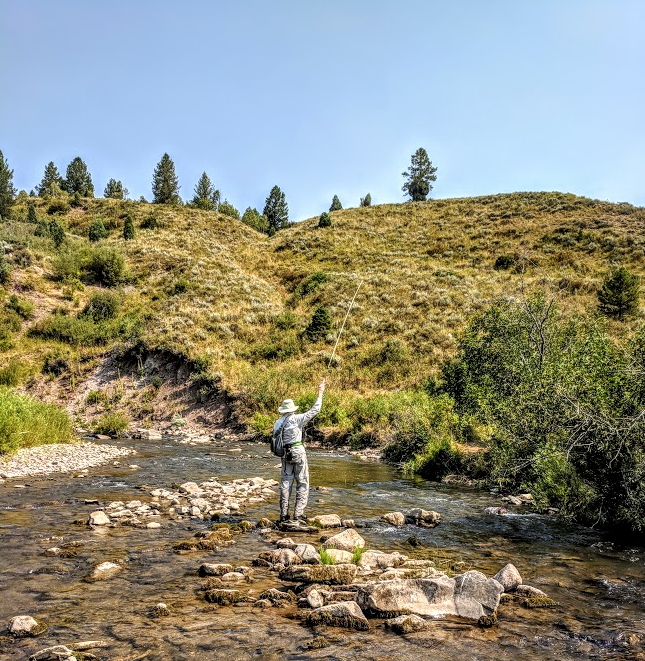Administration weakens the Clean Water Act. Here’s how you can help advocate for our streams.
On April 21st, the U.S. Environmental Protection Agency (EPA) and Army Corps of Engineers (Corps) published a final “Waters of the U.S. Rule.” This rule replaces a 2015 Rule, which clarified the extent of Clean Water Act protections for small streams and wetlands. This new 2020 rule not only reverses the clarifications made in 2015, but further reverses protections that have been in place dating back to the 1970s. The rule will go into effect in 60 days.
What it Means for Clean Water
Research by Trout Unlimited suggests that the new rule will end Clean Water Act protections for more than six million miles of streams—half of the U.S. total. These streams contribute to the drinking water supplies of 117 million Americans and provide essential fish and wildlife habitat that support a robust outdoor recreation economy worth $887 billion.
The rule will also erase protections for more than half of the nation’s wetlands, a critical part of functioning watersheds. Wetlands help recharge groundwater, filter pollution, and protect communities from flooding. In eliminating these protections, the new rule will deregulate a host of development activities, such as pipeline construction, that can, over time, degrade hunting and fishing opportunities in every state in the country.
“The E.P.A.’s new policy comes with a price tag,” Chris Wood, president and CEO of Trout Unlimited, wrote in a recent op-ed in the New York Times with National Wildlife Federation CEO Collin O’Mara and former U.S. Fish & Wildlife Service director Dale Hall.
“When the E.P.A. stops protecting these streams and wetlands, states will have to foot the bill for regulatory oversight; many states may decide not to step in at all. When developers fill in wetlands, local communities will be on the hook for cleaning up more frequent flood damage. When headwaters are polluted, cities downstream will pay to treat their drinking water.”
The Clean Water Act is vital to TU’s work and to anglers across the nation.
Whether TU is working with farmers to restore small headwater streams in West Virginia, removing acidic pollution caused by abandoned mines in Pennsylvania, or protecting the world-famous, salmon-producing, 14,000-jobs-sustaining watershed of Bristol Bay, Alaska, we rely on the Clean Water Act to safeguard our water quality improvements.
What comes next? How can TU councils, chapters and members advocate for clean water?
Although this is a “final” rule, you can still help by voicing your concerns about this rule and related attacks on clean water protections.
Write to Congress & Your Governors:
- Congress: Tell your members of Congress that you are deeply concerned about this rule and other attacks on the Clean Water Act, and ask them to help protect our nations’ waters. Urge them to oppose any legislative proposals to further weaken protections, and to do everything in their power to protect clean water.
- Governors: Tell your Governors that you are concerned about rollbacks for protections of waters in your state. Many states will challenge this new rule in court. Urge your Governors to join a challenge against this rule and do everything in their power to protect state waters.
Share your stories: We encourage you to share your stories and concerns through letters to local papers or blog posts on TU.org or other online publications. The TU Communications team has templates and tools available to assist you. Contact Shauna Stephenson (shauna.stephenson@tu.org) for help drafting or submitting.
Tell your friends: Here is a sample post that you could use to share the news with friends on Facebook. Feel free to cut and paste or make your own.
The administration and the EPA have mounted an attack on clean water in the United States. Help @troutunlimited fight attempts to rollback and reduce Clean Water Act protections for millions of miles of rivers and streams across the country. Stand up, speak out and tell our governor and members of Congress to fight to protect cold, clean water. https://standup.tu.org/stand-up-for-clean-water/ #troutunlimited #tuvolunteer #cleanwateract
Additional Clean Water materials:
- 2020-January update to TU Volunteers
- 2019-Sportsmen’s Fact Sheet
- Learn why it’s so important to protect clean water.
For questions, please contact:
| Steve Moyer Vice President of Government Affairs steve.moyer@tu.org | Kate Miller Director of Government Affairs kate.miller@tu.org |


